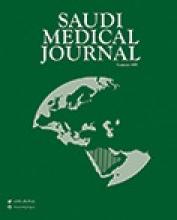Abstract
OBJECTIVE: Hypertension and stroke are 2 major public health problems worldwide. Several biological and non-biological risk factors for stroke have been identified in the past. Little is known regarding risk factors for stroke among the Arabic population in Gaza. To identify potential risk factors we investigated compliance with the therapeutic regimen and life style factors which may increase the risk for stroke.
METHODS: To research this study question, a pair matched case control study was conducted in Gaza Strip (Shefa Hospital, Nasser Hospital, Khan Younis Hospital, and related primary health care clinics) in 2001 (from January through to December) among 112 patients, who had been hospitalized for acute stroke and history of hypertension, and 224 controls with history of hypertension from primary health care clinics.
RESULTS: Conditional logistic regression models show significant associations between stroke and medication not taking as prescribed (odds ratio (OR)=6.07; 95% confidence interval (CI)=1.53, 24.07), using excessive salt at meals (OR=4.51; 95% CI=2.05, 9.90), eating diet high in fat (OR=4.67; 95% CI=2.09, 10.40), and high levels of stress (OR=2.77; 95% CI=1.43, 5.38). No significant association between smoking and the development of stroke (OR=2.12; 95 CI 0.82, 5.51) was found. Regular physical exercise was a protective factor (OR=0.26; 95% CI=0.12, 0.57).
CONCLUSION: Our results on risk factors for stroke confirm several other studies. In future programs on health promotion among hypertensive men and women in Gaza these modifiable risk factors could be addressed by health education strategies.
- Copyright: © Saudi Medical Journal
This is an open-access article distributed under the terms of the Creative Commons Attribution-Noncommercial-Share Alike 3.0 Unported, which permits unrestricted use, distribution, and reproduction in any medium, provided the original work is properly cited.






